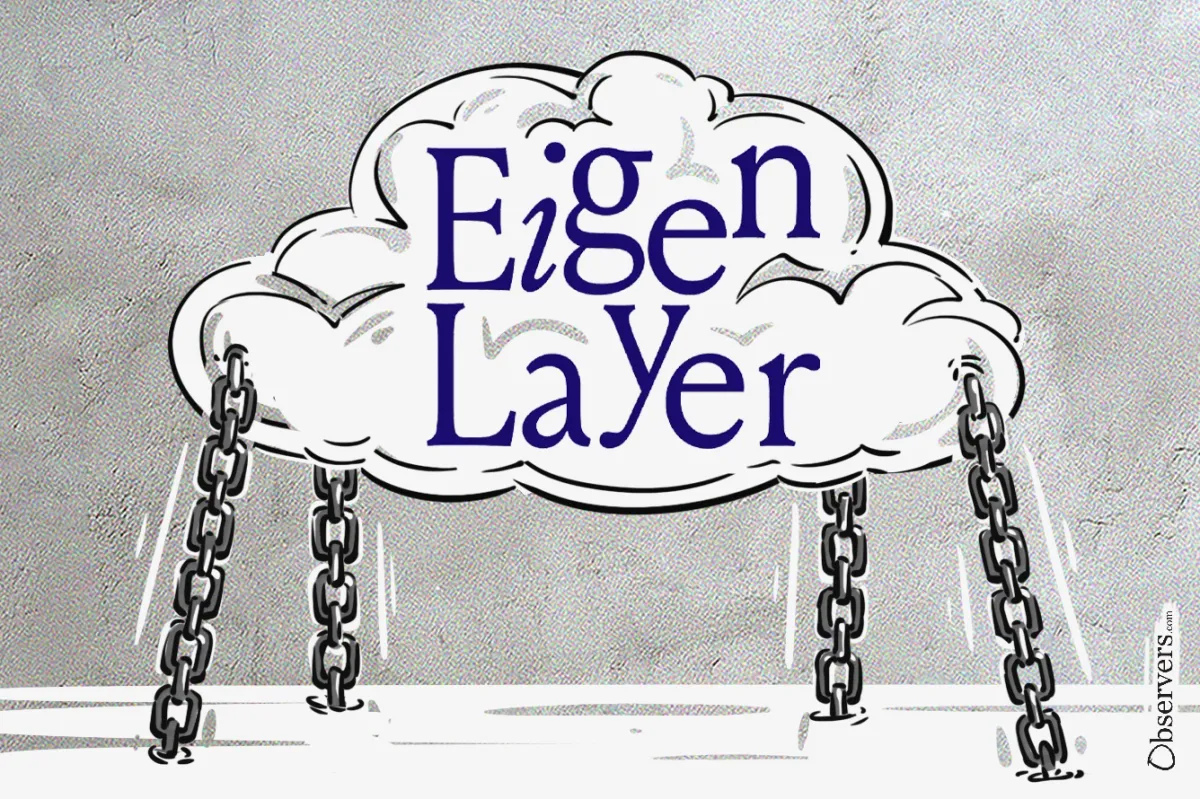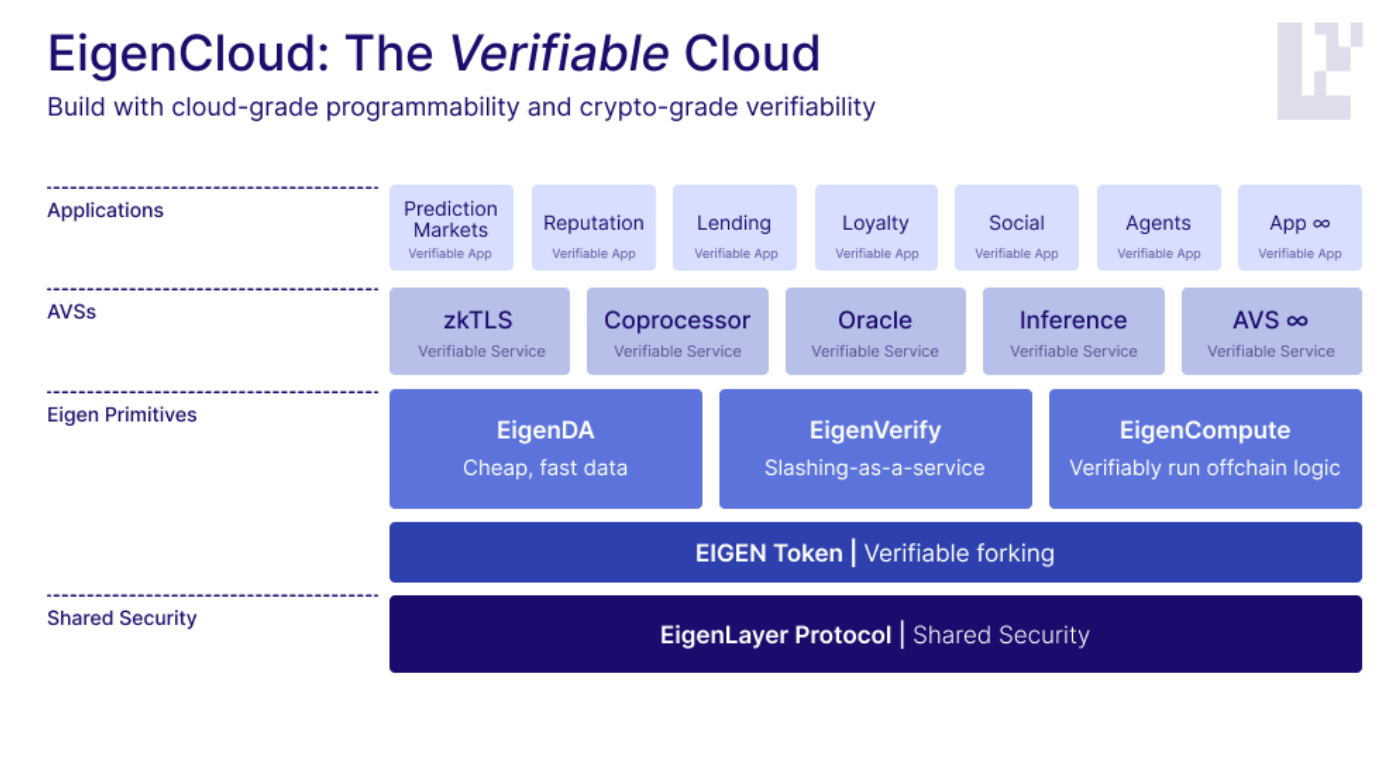
EigenLayer has officially launched EigenCloud, a major new addition to its product lineup, alongside a $70 million investment in EIGEN tokens from a16z.
Verifiability-as-a-Service
While blockchains are good at verifying data, they are still limited in programmability—especially for applications that need external data or rely on tools like APIs and machine learning libraries. This has made it difficult to build real-world applications entirely on-chain, as not every type of computation fits within the constraints of a smart contract.
EigenCloud offers a new path. By leveraging a network of decentralized verifiers recruited through its base restaking service, it provides modular services that work as extensions for verifying data off-chain.
EigenDA provides scalable and decentralized data availability for rollups and other applications that need to publish large amounts of off-chain data.
It ensures data availability by using a network of restaking operators who are slashable if they fail to store or serve the data as required.
EigenCompute enables decentralized execution of off-chain computation tasks, such as AI inference or complex data processing.
It relies on restaking operators who perform the computation and can be held accountable through slashing for incorrect or dishonest execution.
EigenVerify provides trust-minimized verification of off-chain computations or data using cryptographic proofs.
It leverages proof systems like SNARKs or STARKs to validate results on-chain efficiently, ensuring correctness without repeating the computation.

According to the team, EigenCloud is designed to simplify the developer experience by bundling together EigenDA, EigenCompute, and EigenVerify, along with new tools for building on-chain and off-chain applications. It lets developers run complex logic off-chain in secure, verifiable environments.
Here’s how the flow works: A developer defines their application logic to run off-chain using EigenCompute. The computation is executed by a group of operators, secured by restakers who allocate a portion of their stake to support that specific app. The results are then posted to EigenDA, making them publicly accessible for anyone to verify using EigenVerify. If an operator misbehaves, EigenLayer’s token forking mechanism enables the system to slash them.
Market Demand or Search for Blockchain Use Case?
It’s common in the blockchain industry to build applications first, and then look for market fit later. Backed by specialist VCs and token-driven incentives, many projects experiment aggressively, even before real-world demand emerges. So the question arises: is EigenLayer, with its expansion into EigenCloud, following the same pattern—or is this a more grounded step forward?
The Eigen team has proposed a wide range of use cases for EigenCloud, many of which go far beyond traditional blockchain capabilities:
- Verifiable DeFi Vaults: These vaults can use machine learning and real-time oracles to run sophisticated, automated trading or rebalancing strategies off-chain. Since these strategies directly manage user funds, verifiability becomes essential for trust and auditability.
- Pricing Validation for Tokenized Assets: Partners like Securitize are working with EigenVerify to ensure accurate and verifiable pricing for assets like BlackRock’s BUIDL fund, offering a potential standard for tokenized asset pricing integrity.
- Verifiable Data Onramps: Enterprises and Web2 platforms can bring external data on-chain with proof of origin and integrity, useful for insurance, supply chains, IoT, and regulatory reporting.
- ZK Proof Offloading: zk-rollups or other cryptographic systems can outsource the heavy task of proof generation to EigenCompute operators, improving efficiency while maintaining trust via EigenVerify.
- AI Inference as a Service: Developers can deploy large AI models off-chain and deliver responses to smart contracts or dApps, while proving the inference was done honestly.
- DAO Governance Execution: DAOs can outsource and verify vote tallying, proposal routing, or even quadratic funding decisions off-chain, minimizing gas usage while maintaining transparency.
Despite the promise, however, the market demand for verifiable off-chain compute remains speculative. Most DeFi users still chase yield over verifiability, and few demand cryptographic guarantees unless something goes wrong.
Many of the problems EigenCloud solves—like verifiable AI inference or proof-backed vault logic—are still early-stage needs, mostly relevant to institutions or advanced developers. Meanwhile, implementing verifiable logic is complex, and slashing-based enforcement through token forking is unproven at scale.
One thing is for sure: EigenCloud will complement Eigen's core services. Despite being the largest restaking protocol, EigenLayer’s TVL has declined from $18 billion to $10 billion, though activity remains robust—with 73 active AVSs including rollups, oracles, and data providers currently live.
EigenCloud could help reverse this trend by making it easier for developers to launch new AVSs—particularly those needing off-chain compute and proof services. It effectively expands the design space for blockchain-secured apps beyond what smart contracts alone can support.
As of now, early access to EigenCloud has started rolling out, with the full product expected in Q3 2025, and broader staking incentives planned in phases. We are here to Observe what happens next.

